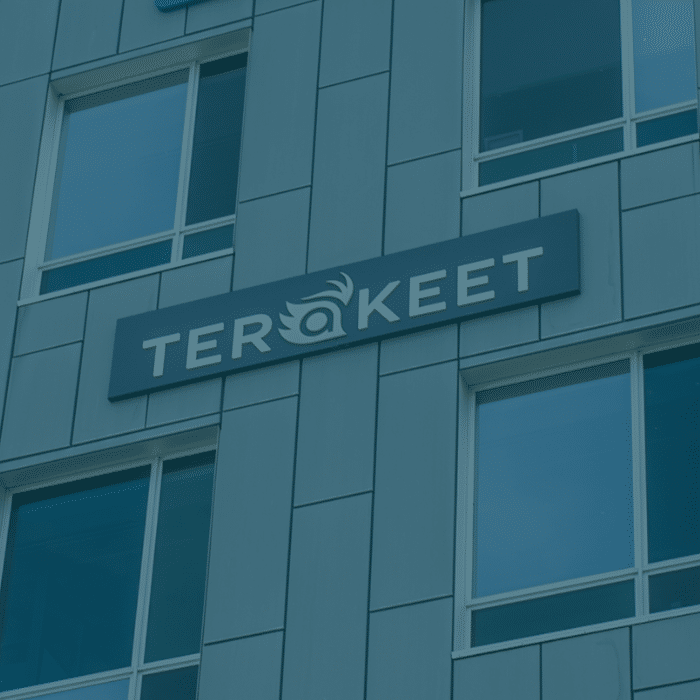
Online Reputation Management: 7 Techniques for Big Brands
Mar 11, 2022|Read time: 17 min.
Key Points
- Online reputation management is the process of controlling the online narrative of a person, company, or brand.
- It consists of reputation protection, monitoring, crisis management, and reputation recovery.
- 88% of consumers perform online research before making a purchase.
Few things are more important than your brand’s online reputation. It builds trust with customers, employees, and investors. As a result, you can grow your business more effectively and deliver better ROI. The best way to maintain your brand’s image is through online reputation management.
Sadly, too many brands wait until they experience a public relations crisis before they invest in their digital reputation. And that’s primarily the industry’s fault because we’ve done a poor job of explaining exactly what reputation management is, and when to invest in it.
What is online reputation management (ORM)?
Marketing term
Online Reputation Management
Online reputation management, or ORM, is the process of managing the online information about a person, company or brand. The primary goal of ORM is to establish an accurate, sustainable, and controllable search landscape that represents the full arc of an organization or CEO.
The process involves publishing and optimizing online content to control the first page of Google for branded search queries. A typical ORM strategy might include review management, social media marketing, public relations, search engine optimization, and customer service tactics.
However, digital reputation management broadly falls under the category of search engine optimization (SEO).
Why? Because whether you’re focused on brand health, full-on damage control, or reputation recovery, your top priority should be to control what people see when they search your brand.
In fact, 98% of searchers won’t look past the first page of Google results for any query. Therefore, the content that shows up on page one overwhelmingly controls public perception. If you want to own your narrative, you need to control the content that appears on page one when stakeholders search for your brand.
0
%98% of searchers won’t look past the first page of Google results for any query.
That being said, there are numerous digital channels involved in online reputation management. Creating a positive impression of your brand requires actively managing all of them. The channels can be broken down into the following categories according to the PESO model.
Owned media
Owned media encompasses any online media that you control, such as your brand’s website, blogs, or pages on third-party websites.
This is one area where SEO plays a critical role. If you can position more controllable web pages on the first page of Google, Yahoo, Bing, or other search engines, then you’ll have more control over your online reputation.
Earned media
By contrast, earned media encompasses all free exposure and coverage your brand receives from third-party platforms. For example:
- Press coverage
- Articles and blog posts on other websites
- Forums (Quora, Reddit, etc.)
- Third-party listings (Capterra, Glassdoor, Trustpilot, etc.)
- Review sites you don’t control (Google, Yelp, etc.)
Earned media is very important for online reputation management because positive brand mentions reinforce trust with both your audience as well as Google. Additionally, as the Google algorithm sees an increasing number of positive off-page signals, they will attribute more authority and trustworthiness to your brand, which translates into higher rankings.
Shared media
Shared media refers to any type of content marketing that is shared between your brand and others. For example, your various social media accounts are shared media. Although you own your profiles, and you create individual social media posts, anyone can respond with positive or negative comments.
It’s important to pay attention to how people engage with your brand online, especially across shared media channels. If you have numerous bad reviews on Facebook or negative feedback on Twitter, it can damage your brand’s image.
Make a concerted effort to monitor any mentions of your brand in real-time and seek advice from online reputation management services to address negative feedback.
Paid media
Paid media includes all channels, platforms, and digital marketing vehicles where you must pay to feature your brand. Social media ads, Google Ads, Microsoft Ads, LinkedIn sponsored messaging, display ads, native ads, and sponsored content are all examples of paid media.
Paid media offers some opportunities to reinforce your preferred narrative. However, it’s not as valuable as earned or owned media because consumers trust organic search results more than advertisements.

Why reputation management is important
0
%85% of consumers give online reviews the same weight as word-of-mouth
–BrightLocal0
%of customers are more likely to choose businesses with five-star ratings
–BrightLocal0
%82% of consumers are less likely to choose businesses with negative reviews
–BrightLocalWe’ve already touched on this, but it’s important to highlight how much influence negative reviews have over brand sentiment.
Those are staggering statistics, and they tell a very simple story. Most customers seek out reviews, trust them, and make decisions based on what they find.
Your brand’s reputation is worth billions of dollars
Due to the speed and reach of social media, a negative experience can go viral in a few hours, ruining your business’s reputation. In 2017, a United Airlines flight crew dragged a passenger off a plane and someone recorded the incident. The video quickly went viral on social media with more than 100 million views.
The result? United Airlines lost over one billion dollars in market value. This example, and others like it, highlight just how destructive negative press can be to your brand.
Impact on sales
Your online reputation also has a direct impact on sales. 53% of buyers do research on a search engine before they make a purchase.
If potential buyers see a string of negative reviews or press about your brand, it could sour their view of your company and lead them to purchase from one of your competitors.
0
%53% of buyers do research on a search engine before they make a purchase
–GoogleOn the other hand, if they see a large number of positive reviews and press, they’re more likely to trust your brand and make a purchase.
Customer feedback
Managing your online reputation also allows you to collect valuable customer feedback. As a result, you can improve your products and services, as well as customer experience.
Yes, you should perform customer surveys and polls to improve your company. But don’t ignore unsolicited feedback that could uncover new and better ways to serve your target audience.
Make Connections that Matter
Uncover what your customers are looking for in real time and meet their needs with valuable content.
Online reputation management examples
Online reputation management isn’t only for brands facing crises. In fact, prevention is a crucial part of managing a reputation. Today, negative news and opinions can go viral in an instant, causing real-time damage to brand reputation.
Here are just a few examples of how Terakeet helped customers improve their online reputations:
An executive at a multi-billion-dollar company
An executive at a multi-billion-dollar company whose business took a hit after a major news website published an unfavorable story. The story was inaccurate, yet other media publications still picked it up. The story eventually spread to the executive’s social media accounts, affecting the business’s bottom line. Terakeet rebalanced the executive’s search landscape to tell a truer and more holistic story of the individual’s accomplishments.
A major financial services company
A major financial services company whose sales were suffering from a handful of negative reviews. Unfortunately, a few negative reviews had a big impact. Prospective customers often brought the reviews up during the sales process, influencing the company’s ability to close deals. Terakeet restored control over the first page of Google for the company.
An executive at a high-profile firm
An executive at a high-profile firm who was plagued by an outdated news story. When people Googled the executive’s name, they found an old story about a past business deal. Terakeet repositioned the outdated and irrelevant article deeper in Google’s search results where few stakeholders would discover it.
As you can see from the above examples, online reputation issues have serious business impacts. Furthermore, problems that stem from a central figure at the company can also damage the brand’s reputation.
Forrester Study White Paper
See how fully integrated SEO drives business impact across the enterprise.
How online reputation management is different for enterprises
Most online reputation management firms tend to focus on local business listings or personal branding for individuals.
However, with enterprise companies, scale changes the game. Mistakes impact millions of customers. As a result, business owners lose control of brand messaging online and offline.
For instance, imagine your website experiences a three-hour outage. If it’s a small business website, customers may not even notice. However, that same three-hour window might cost an enterprise ecommerce business millions of dollars in sales. Even worse, it would most likely make the evening news.
And if you’re an enterprise-level platform like Slack or Facebook? Get ready for three hours of Armageddon-style memes on social networks.
Now, imagine the impact of a mistake that actually hurts the customer or an egregious act by a company executive. What if your site gets hacked and bad actors gain access to your customer data?
Small businesses can move on quickly, but enterprise businesses will face a storm that could last weeks, months, or even years.
How online reputation management is different for executives
Many brands have become intrinsically tied to their founder or CEO in the public eye. It’s especially true if there’s a powerful company origin story. For example, you can’t describe Tesla or SpaceX without mentioning Elon Musk. Alongside that, he’s developed himself as a brand, promoting his own backstory and encouraging nicknames like “The real-life Iron Man.”
Not every CEO wants to be famous, but it’s a byproduct of running a famous brand. Thanks to social media, CEOs are in the spotlight. And customers take missteps very personally.
Controversial personal behavior by CEOs can spark destructive news cycles and social media boycotts. A single Tweet can send stock prices plummeting and drive away investors.
That’s why CEO reputation management establishes an executive’s legacy beyond their leadership role in the company.
The Brand Intelligence Report
Exclusive AI insights, search trends, and brand strategies, delivered to your inbox.
7 Online reputation management techniques for brands
Let’s look at the most important things you can do to strengthen your online brand reputation.
1. Perform a brand audit
A brand audit is a critical first step in your online reputation management strategy. Take inventory and assess your entire online presence, including your website, blog, social media profiles, and your third-party business profiles.
Scrutinize your Google search results as well. What do people see when they search for your brand name and related keywords? Are there any off-brand or negative results? Are there too many news articles and not enough controllable brand assets? Remember, positive articles are great until something bad happens. Then, those stories will flip to negative mentions overnight.
2. Monitor brand mentions
An effective way to manage your brand online is to actively monitor brand mentions on the web. Set up alerts for your brand name and related keywords, and then react quickly when you see any mention, positive or negative. This includes mentions on social media, as well as any mentions your brand receives in blog posts, forums, videos, etc.
The faster you identify and contain negative mentions, the better. Most people are willing to forgive honest mistakes if the company makes a good-faith effort to remedy the situation.
3. Respond to negative reviews
You may be tempted to ignore negative online reviews and hope they go away, but that’s a mistake. Negative reviews are an opportunity for your brand to address problems head-on, demonstrate customer care, and form a more authentic connection with potential customers.
Respond to all reviews, whether they’re positive or negative. Thank customers for their feedback, even if it’s critical. And always offer real solutions to problems.
If a customer had a bad experience, they don’t want a coupon for 20% off their next purchase. With that approach, there won’t be a next purchase. Go above and beyond to show customers you stand behind your brand, and they can trust you to make things right.
If you can turn a negative review into a positive customer experience, your online reputation will benefit.
4. Invest in SEO
SEO is an essential part of online reputation management, but the strategy is slightly different.
Most commonly, we use SEO to rank many different pages on one website for a diverse set of search queries. However, in terms of ORM, we use SEO to rank many different websites for a few brand-focused queries. As a result, you’ll be able to push down negative search results and replace them with positive content that you control.
Your branded SEO strategy should focus on optimizing as many controllable web pages as possible for brand-related keywords.
- Create valuable content on your website for reviews as well as leadership pages
- Build backlinks to key pages you want to rank on Google page one
- Earn positive brand mentions through digital PR, events, sponsorships, and influencer marketing
- Be active on key social media platforms like Twitter, LinkedIn, Facebook, and Instagram
- Claim and optimize relevant third-party profiles, such as Google My Business, Yelp, Trustpilot, and business profiles where you control the content.
When it comes to SEO for reputation management, remember that Google almost always prioritizes authoritative, trustworthy sources. In light of this, focus on increasing the authority and trustworthiness of your own website, as well as optimizing your presence on authoritative third-party sites.
No company is better at SEO and reputation management than Terakeet, which is why we get testimonials like this:
Terakeet gets 11 points out of 10. Their approach is so logical, and they quite simply get results.
— CMO, Fortune 100 Company
5. Leverage public relations
Good public relations can help improve your online reputation by generating positive press for your brand. This press can take many forms, such as:
- Guest posts on high-quality websites
- Interviews of company executives
- Press releases
- Branded events
- Charitable events
- Co-marketing with well-respected individuals or brands in your industry
- Podcast appearances
- Live streams where you answer any and all questions
- Public statements addressing any significant mistakes made by your company
The goal of your public relations efforts in terms of online reputation management is to highlight your key values and establish trust and expertise.
6. Encourage customer reviews
One of the best online reputation management strategies is to encourage customers to leave reviews on sites like Google, Yelp, Trustpilot, Capterra, etc. That’s because positive reviews can occupy valuable real estate in Google’s search results and influence customer behavior.
There are a few things you can do to encourage customers to leave reviews:
- Send emails to your customers, directly asking them to leave reviews
- Make it easy for them by providing clear instructions on where and how they can leave a review
- Incentivize them with discounts or other special offers for leaving a review
- Respond to all reviews, both positive and negative, so that customers feel like their feedback genuinely matters
When it comes to online reputation management, customer reviews are one of your most valuable assets. Take advantage of this by encouraging customers to leave reviews on relevant, trustworthy review sites.
See how Terakeet improved the Trustpilot profile of one of our clients from three negative reviews to over 12,000 five-star “Excellent” reviews.
7. Promote positive content
Finally, promote content that shines a positive light on your brand, such as:
- Placing testimonials and reviews prominently on your website
- Occasionally sharing positive reviews on social media, along with a thank you to the reviewer
- Showcasing prominent third-party endorsements of your brand
- Working with influencers to promote content you have created
- Sharing content where you are favorably mentioned
- Promoting any joint efforts done with individuals or brands
The best examples of self-promotion are when you build a bridge between what your brand does and what your audience cares about.
Nine online reputation management tools
Online reputation management requires a lot of effort and time to manage and track. There are many tools that help you track your online reputation, so you can monitor how your brand is seen.
Below are 9 of our favorite online reputation management tools:
BrandMentions
BrandMentions allows you to listen in on every social channel as well as a variety of blogs, news, and review sites. It then gives you an overview of how your brand is being talked about as well as who is talking about it. You can also see who is talking about your competitors, which gives you insight into the reputation management strategies they are using.
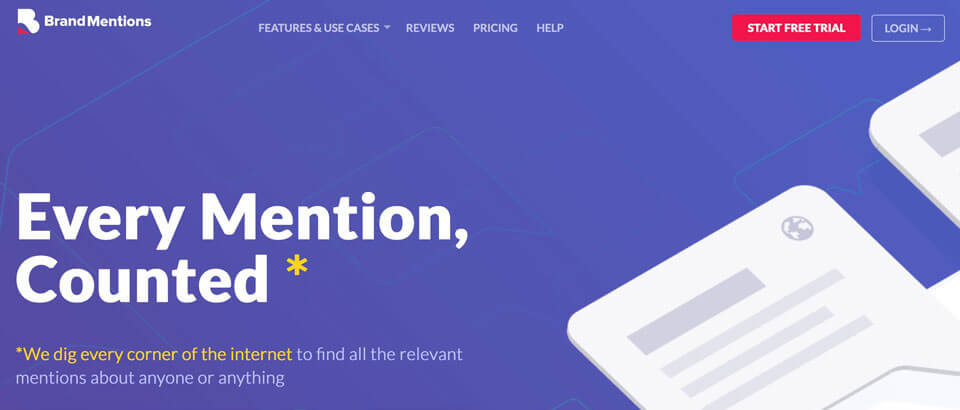
Buzzsumo
Buzzsumo is a platform that allows you to search the web for any content around specific terms or brand names. You can see how popular a piece of content is, as well as who has shared it and where. This is a great tool for identifying any negative sentiment around your brand and tracking your share of voice online.
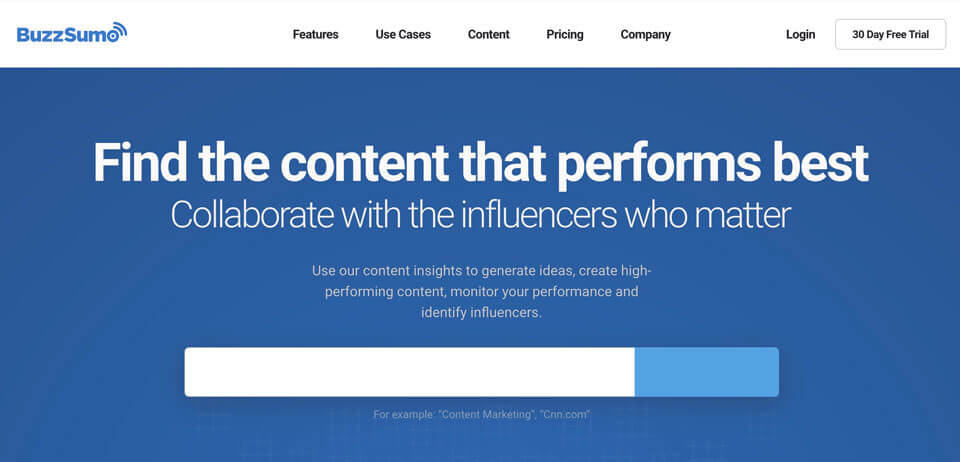
Mention
Mention provides brands the opportunity to monitor social media and online conversations around their brand. The platform provides you deep insights into who is talking about your brand and what they are saying. You can respond directly to specific social media conversations, as well as create social media content based on audience trends you are observing.
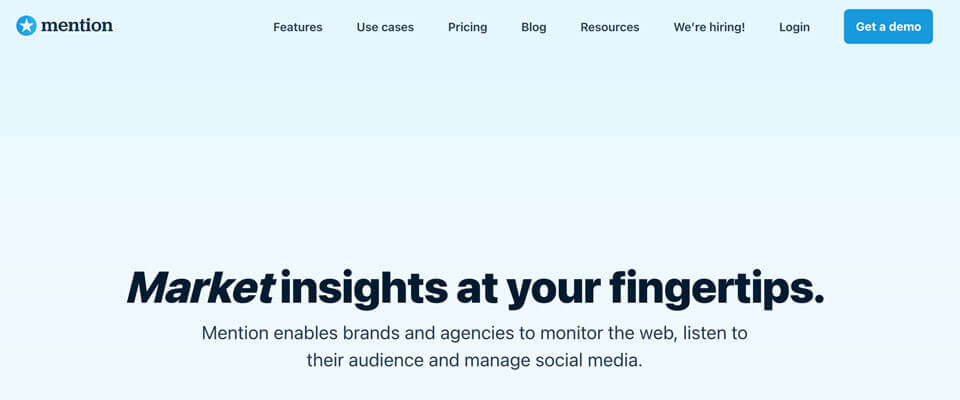
Google Alerts
Google Alerts is a free tool to track any mentions of your name, brand, products, keywords, and competitors. Once it finds a mention of the terms you entered, it will automatically send an email to you with the link.
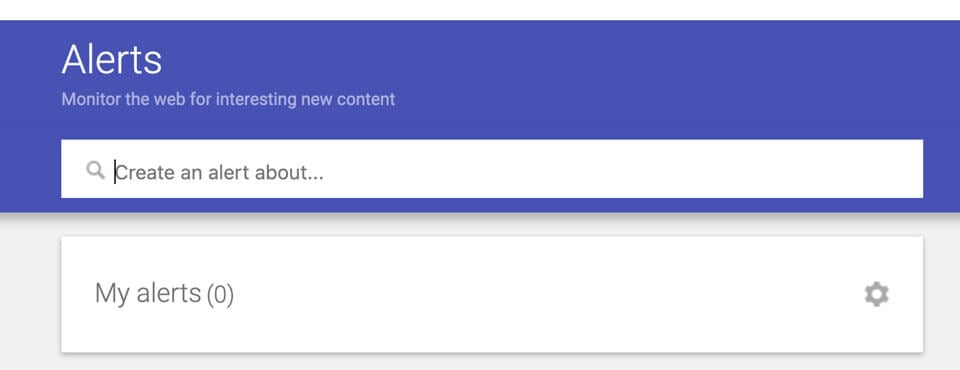
Socialmention
Socialmention is an online tool where you can enter a term and choose from a variety of search options. It can search blogs, microblogs, images, and more and will showcase the results from the past day. The granular level of filtering allows you to find discussions about your brand that you might miss otherwise.

Reputology
Reputology is a review monitoring platform that can help a business manage their reviews. It can track reviews for your brand across multiple review platforms and allow you to respond to them. It also gives you the opportunity to automatically poll customers at key points in the customer journey so that you can identify and address problems before they become significant.
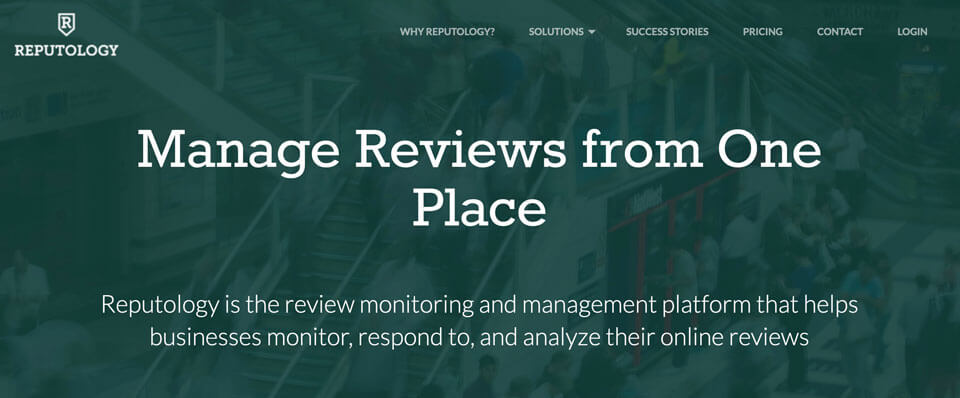
Birdeye
Birdeye offers enterprise level internet reputation management tools to deliver exceptional customer experiences. One of its greatest strengths is that it allows you to automatically request reviews from customers and then respond to those reviews on more than 150 review sites. This makes it much easier to garner positive customer reviews, as well as respond to any negative ones that arise.
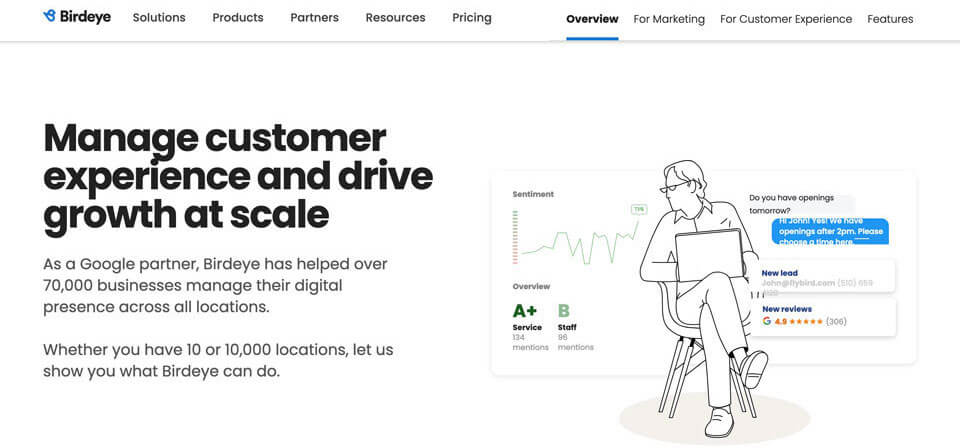
GatherUp
GatherUp is a full suite of tools that focuses on the customer experience as well as online review management. It offers review request tools, review response tools, and social media tools that allow you to easily share your positive reviews. It also has a built-in review widget that can be embedded on any website. As a result, you can gather Voice of the Customer feedback and monitor your online reputation.
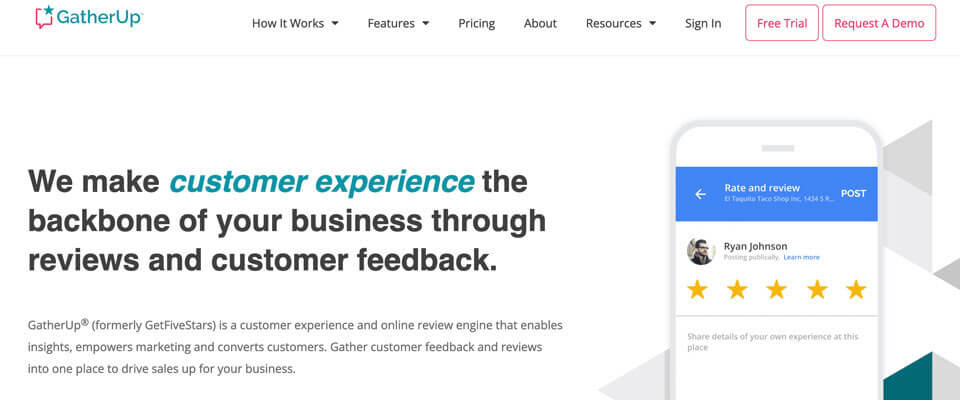
Meltwater
Meltwater provides an all-in-one brand reputation monitoring platform. It allows you to monitor a large number of sources, including social media, online news, print media, podcasts, review sites, and more. It also provides a social media management tool for publishing content and engaging with followers. Additionally, it includes a social influencer management platform to identify relevant influencers and run reputation management campaigns.
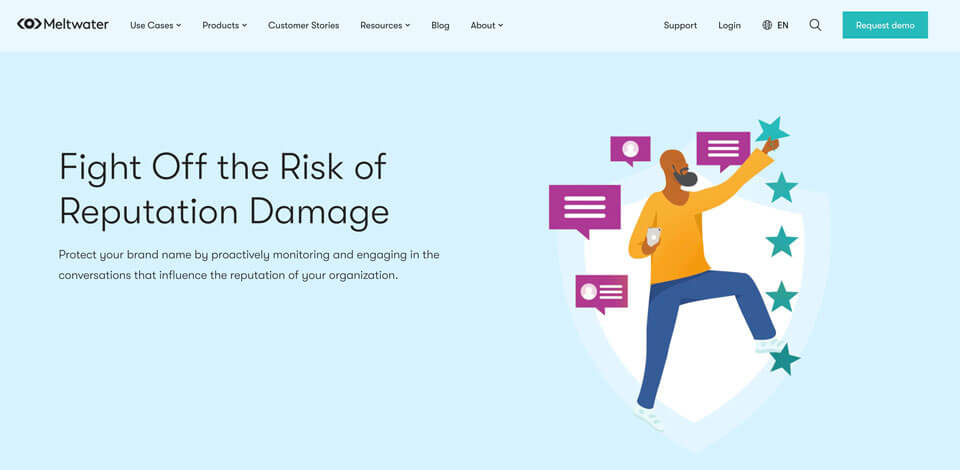
When to hire an online reputation management company
There’s plenty to consider when choosing online reputation management services. Here are a few important questions you can ask before making a final decision.
- Do you have a track record of success working with enterprise brands like us?
- Can you explain your privacy, security, and data management systems?
- Can you demonstrate a history of sustainable results, not just temporary successes?
- Do you have referenceable customers?
- How long have you been in business?
The stakes are high for Fortune 1000 brands. An imperfect reputation impacts hiring, retention, sales, and investor confidence. So it’s absolutely critical to work with a company that truly understands how Google works.
Your success is our success. Ask us how we can help put your brand in a much stronger place online.
FAQs
Online reputation management, or ORM, is the process of managing the online information about a person, company or brand. The primary goal of ORM is to establish an accurate, sustainable, and controllable search landscape that represents the full arc of an organization or CEO.
Online reputation management involves publishing and optimizing digital content to control the first page of Google. A typical ORM strategy may include review management, social media marketing, public relations, search engine optimization and customer service tactics. Here are some examples of what reputation management services do.


